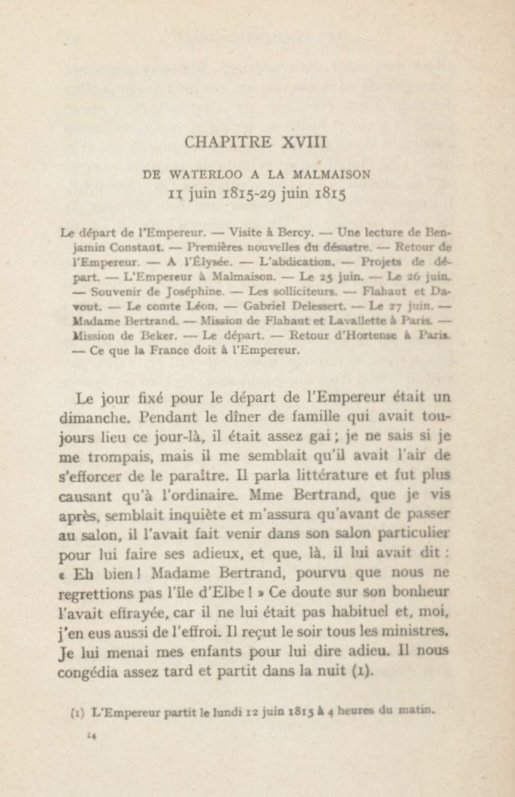Let’s have another look at Hortense’s Memoirs. If you want to read the book it is available for free at the side bar in English and French. Use the widget on the sidebar to translate the text below into pretty much any language.
Together we could win.
Hortense’s memoirs continues:
CHAPTER XVI
FROM WATERLOO TO MALMAISON ( JUNE 11-JUNE 29, 1815),
Napoleon Leaves for the Front—Visit to Bercy—Benjamin Constant Reads Aloud—First News of the Disaster—The Return of the Emperor the Elysée—The Abdication—Plans for Flight—Napoleon Visits Malmaison—June 25–June 26–Memories of Josephine—Flahaut and Davout—June 27—Madame Bertrand—The Day of Departure—Flahaut and Lavallette in Paris—The Departure of the Emperor—Hortense Returns to Paris—What France Owes Napoleon.
THE day set for the Emperor's departure for the front was a Sunday. During the family dinner, which always took place on that day of the week, he seemed in high spirits. I may be wrong, but this gaiety appeared to me to be assumed. He spoke about literature and was more talkative than usual.
Madame Bertrand, whom I saw afterwards, was worried and told me that before entering the drawing-room he had sent for her to come into his private reception room to say good-by and had made the following remark, "Well, well, Madame Bertrand, may we not have cause to regret the island of Elba!"
This doubt as to his success had alarmed her, for it was unusual, and I too was frightened to hear of it. That evening he received all his cabinet ministers. I brought him my children to say good-by.
He did not dismiss us till quite late, and he left Paris before day-break. The Prince d'Eckmühl had remained in command of the garrison of Paris. This was somewhat reassuring, as our position resembled so much that of the year before that we feared a similar outcome.
I remained at home, seeing little of the Emperor's brothers, who treated me as a complete outsider. I heard only the most important items of news through the newspapers.
Private letters informed us that the welcome the Emperor received in the provinces and from the troops fully equaled that which we had witnessed in Paris. Soon afterwards the sound of cannon told us of a first victory. But how many more victims would still be required!
The news of another military success, the more melancholy since it was gained against our countrymen, reached us from Vendée. Monsieur de la Rochejacquelein had been killed while fighting bravely for his cause.
People rejoiced at the news in my presence. I replied, "We should feel sad at being in a position that causes us not to regret the death of a Frenchman."
A feeling which I could not explain made me want to go and see some corners of Paris I did not know, and which I imagined I might be seeing for the first and last time. I visited Bercy, stopping at the house of Madame de Nicolay. There I met General de la Roche-Aymon, who had always been an ardent supporter of the Bourbons.
He related what the Faubourg Saint-Germain was saying about me. Their dislike was so violent and the stories they told so grotesquely exaggerated that we could not help laughing about it. Not only was I supposed to have taken an active part in bringing back the Emperor, but I was also accused of having ordered General Quesnel to be thrown into a river, although I had never even heard of a general by that name.
Nevertheless, I was surprised to hear Monsieur de la Roche-Aymon make fun of the seriousness with which the Duc de Berry had planned his campaign until March 20. I should have thought the only feeling that the fate of a family in distress and exile could arouse would be one of sympathy.
On the contrary, I frequently heard jests made at their expense. Marshal M___, for instance, who believed he was doing his duty when he conducted the King to the French frontier and refused any other post afterwards, allowed himself to ridicule the hasty flight and embarrassed attitude of the King, a man no longer young. One must always be fortunate in order to escape criticism.
I had given Monsieur Benjamin Constant an appointment to read me a short novel he had just written. We i had reached the climax of the narrative and were all in tears, including the author, when word came that the Duc de Rovigo wished to speak to me.
He informed me that ugly rumors were circulating, and that it was said we had been defeated. That evening his wife and General Sebastiani called. They asked to speak to me privately. Their first words were: "All is lost. Our army has been wiped out. The Emperor will be here tonight, although he did everything he could to be killed."
The original French is available below:





